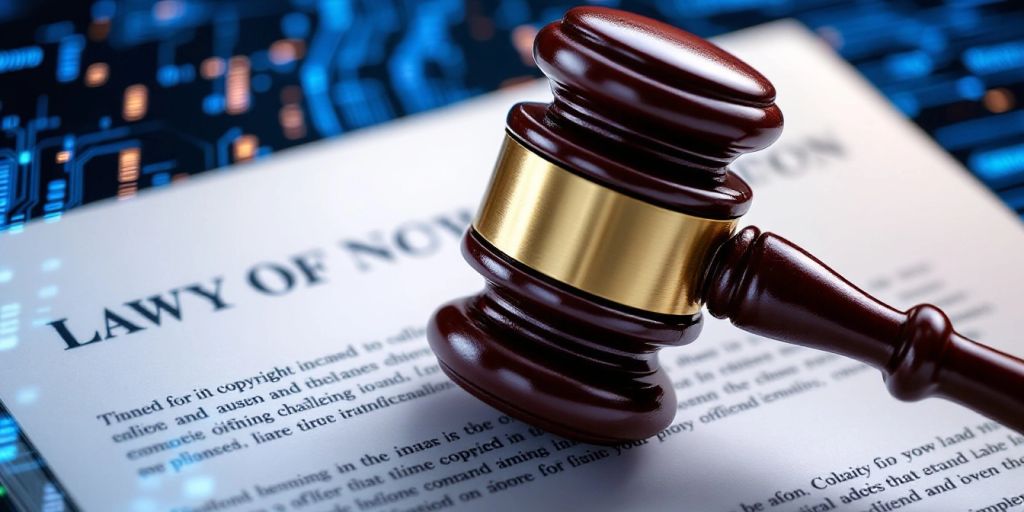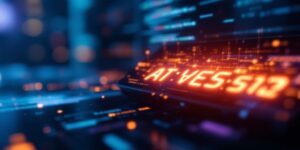
OpenAI, a key player in artificial intelligence, is currently facing significant copyright lawsuits that raise important questions about the future of AI and intellectual property. With organizations like The New York Times accusing OpenAI of using copyrighted materials without permission, the legal landscape is becoming increasingly complex. This article aims to explore the challenges OpenAI faces, the implications for AI development, and potential paths forward.
Key Takeaways
- OpenAI is involved in lawsuits over copyright issues, highlighting the tensions between AI and intellectual property rights.
- The outcomes of these legal battles could reshape how AI models are trained and what data they can use.
- Fair use is a key factor in these cases, as it determines if using copyrighted material for AI training is permissible.
- Public opinion on these lawsuits is mixed, with some seeing them as necessary for protecting creators’ rights.
- Future solutions may involve legal reforms and collaborative efforts to balance innovation with copyright protection.
The Intersection of AI and Copyright Law
Understanding Copyright in the Age of AI
In today’s world, copyright laws are facing new challenges due to the rise of artificial intelligence (AI). As AI systems increasingly use existing creative works for training, legal battles over copyrights and authorship are becoming more common. This situation raises questions about who owns the rights to AI-generated content and how copyright laws apply to these technologies.
Legal Precedents and Emerging Issues
Several legal cases are setting important precedents in this area. For instance, courts are beginning to address whether AI can be considered a creator under copyright law. This could change how we view ownership and rights in the digital age. Here are some key points to consider:
- Current lawsuits involving AI companies and content creators.
- The need for new legal frameworks to address AI-generated works.
- Ongoing discussions about the role of human authorship in AI outputs.
The Role of Fair Use in AI Development
Fair use is a crucial concept in copyright law that allows limited use of copyrighted material without permission. In the context of AI, this doctrine is often cited by companies defending their use of copyrighted content for training models. Some arguments include:
- AI training may fall under fair use for educational or research purposes.
- The lack of specific laws for AI-generated content leads to case-by-case evaluations.
- Protecting innovation is essential for the growth of the AI industry.
The evolving landscape of AI and copyright law requires careful navigation to balance the rights of creators with the need for technological advancement.
This intersection of AI and copyright law is complex and will continue to evolve as technology advances and legal frameworks adapt.
OpenAI’s Legal Battles: A Closer Look

Key Lawsuits and Allegations
OpenAI is currently facing several legal challenges that could change the landscape of AI development. The most notable case involves accusations from The New York Times and other media organizations claiming that OpenAI used their copyrighted materials without permission to train its AI models. This situation raises important questions about the legality of using copyrighted content in AI training.
OpenAI’s Defense Strategies
In response to these allegations, OpenAI argues that the authors misunderstand copyright laws. They emphasize that their use of content falls under the fair use doctrine, which allows for some use of copyrighted material under specific conditions. OpenAI also claims that the plaintiffs have not demonstrated a direct financial benefit from the alleged infringement. To further support their position, OpenAI has implemented filters to prevent the output of entire copyrighted works.
Potential Outcomes and Implications
The outcome of these lawsuits could have significant implications for the future of AI. If the courts rule against OpenAI, it may lead to stricter regulations on how AI models are trained. This could slow down innovation and force developers to rely more on publicly available data. Legal challenges like those faced by OpenAI could highlight potential liabilities associated with using AI models that implicate copyrighted material.
| Potential Outcomes | Implications |
|---|---|
| Ruling in favor of plaintiffs | Stricter regulations on AI training practices |
| Ruling in favor of OpenAI | More lenient standards for AI development |
| Settlement reached | Possible new guidelines for AI and copyright law |
The legal battles OpenAI faces are not just about copyright; they represent a critical moment for the future of AI and its relationship with traditional content creators.
These developments will be closely watched, as they could set important precedents for the entire AI industry.
Impact on AI Research and Development
Challenges for AI Innovation
The ongoing legal issues surrounding OpenAI could create major hurdles for AI innovation. If AI companies face heavy copyright liabilities, it could slow down their growth and development. Here are some challenges they might face:
- Increased legal scrutiny on data sources used for training.
- Hesitation from investors due to potential financial risks.
- A shift towards using only publicly available data, limiting creativity.
Investor and Stakeholder Reactions
Investors and stakeholders are closely watching these developments. Their reactions can shape the future of AI research. Key points include:
- Concerns about the financial viability of AI companies.
- A push for clearer regulations to protect investments.
- Interest in partnerships with established firms to mitigate risks.
Long-term Effects on AI Progress
The long-term impact of these legal challenges could be significant. Here are some potential outcomes:
- A slowdown in the pace of AI advancements.
- Increased collaboration between AI firms and content creators.
- A possible shift in focus towards ethical AI practices.
The future of AI development hinges on finding a balance between protecting creators and fostering innovation. Without this balance, the growth of AI could be stunted.
Public Perception and Legal Opinions
Media Coverage and Public Sentiment
The public’s view on the lawsuits involving OpenAI is quite mixed. Some people think that these lawsuits won’t lead to any major changes, comparing AI learning from data to how humans learn from different sources. Others believe this is a crucial test for copyright law in the AI era.
Expert Legal Analyses
Legal experts suggest that the outcome of these cases will depend heavily on the fair use doctrine. This part of copyright law allows creators to use copyrighted work under certain conditions. The courts will look at four main factors to decide if something is fair use:
- The purpose of the use (commercial or educational)
- The nature of the copyrighted work
- The amount used in relation to the whole work
- The effect on the market for the original work
Comparisons to Historical Cases
When looking at past cases, many see similarities between AI’s use of data and earlier copyright disputes. This could set a precedent for how AI companies operate in the future.
The ongoing legal battles are not just about OpenAI; they could reshape how AI interacts with copyright laws and content creators.
| Factor | Description |
|---|---|
| Purpose | Commercial vs. Educational |
| Nature | Type of copyrighted work |
| Amount | Portion used vs. whole work |
| Effect | Impact on market value |
In summary, the legal landscape surrounding AI and copyright is evolving, and public opinion plays a significant role in shaping these discussions. As the situation develops, it will be interesting to see how both the public and legal experts respond to the outcomes of these cases.
Proposed Solutions and Future Directions

Legal Reforms and Policy Changes
To tackle the copyright issues surrounding AI, we need clear legal changes. This could mean:
- Recognizing AI as a creator in some cases.
- Assigning copyright to the human programmer behind the AI.
- Creating specific laws for AI-generated content.
Ethical Practices for AI Developers
AI developers should follow ethical guidelines, such as:
- Getting permission to use copyrighted materials.
- Being transparent about the data used for training AI.
- Ensuring that their AI respects the rights of original creators.
Collaborative Efforts Between Stakeholders
It’s important for different groups to work together. This includes:
- AI companies, who create the technology.
- Content creators, who produce original works.
- Legal experts, who understand the laws.
Working together can help create a fair system that supports both innovation and the rights of creators. Finding a balance is key to a successful future for AI and copyright law.
Broader Implications for the AI Industry
Potential Ripple Effects
- Legal decisions could lead to a wave of similar lawsuits. This means AI developers might have to be more careful about where they get their training data.
- Companies may shift focus to using only publicly available or original datasets, which could slow down AI progress.
- If AI is seen as infringing on creators’ rights, stricter regulations may follow, affecting how AI is developed and used.
Shifts in AI Training Practices
- Increased scrutiny of data sources used for training AI models.
- A potential rise in partnerships between AI firms and content creators to ensure compliance with copyright laws.
- Development of new guidelines for ethical AI training practices to protect intellectual property.
Future of AI and Copyright Law
The ongoing legal battles will shape the future of AI, determining how it interacts with existing copyright laws. Finding a balance between protecting creators and fostering innovation is crucial for the industry’s growth.
As we look ahead, the outcomes of these legal challenges will not only impact OpenAI but also set the stage for how the entire AI industry navigates copyright issues in the future.
Conclusion
The ongoing lawsuit between The New York Times, OpenAI, and Microsoft is not just a legal issue; it represents a crucial moment for the future of AI and its relationship with traditional media. As we head into 2024, this case will be closely watched, as its outcome could reshape how copyright laws apply to AI technologies. The decision will not only influence OpenAI’s future but also set important standards for the entire AI industry. Balancing the rights of creators with the need for innovation is essential, and this case could pave the way for a clearer understanding of these complex issues.
Frequently Asked Questions
What are the main issues in the OpenAI copyright lawsuits?
The key issues involve whether OpenAI used copyrighted materials without permission to train its AI models, and if this use can be considered fair.
How does copyright law apply to AI?
Copyright law usually protects works created by humans. The challenge is figuring out if AI-generated content can be copyrighted and how to handle works that AI learns from.
What is fair use, and how does it relate to AI?
Fair use allows limited use of copyrighted material without permission. In AI, this could mean using parts of works to create something new, but it depends on specific factors.
What could happen if OpenAI loses the lawsuits?
If OpenAI loses, it might have to change how it trains its AI models, possibly needing permission for more content and facing financial penalties.
How are investors reacting to these legal challenges?
Investors are concerned that these lawsuits could slow down AI development and innovation, which might affect their willingness to invest in AI companies.
What are some possible solutions to these copyright issues?
Possible solutions include legal reforms to clarify copyright laws for AI, ethical practices for using content, and collaboration between AI developers and content creators.


